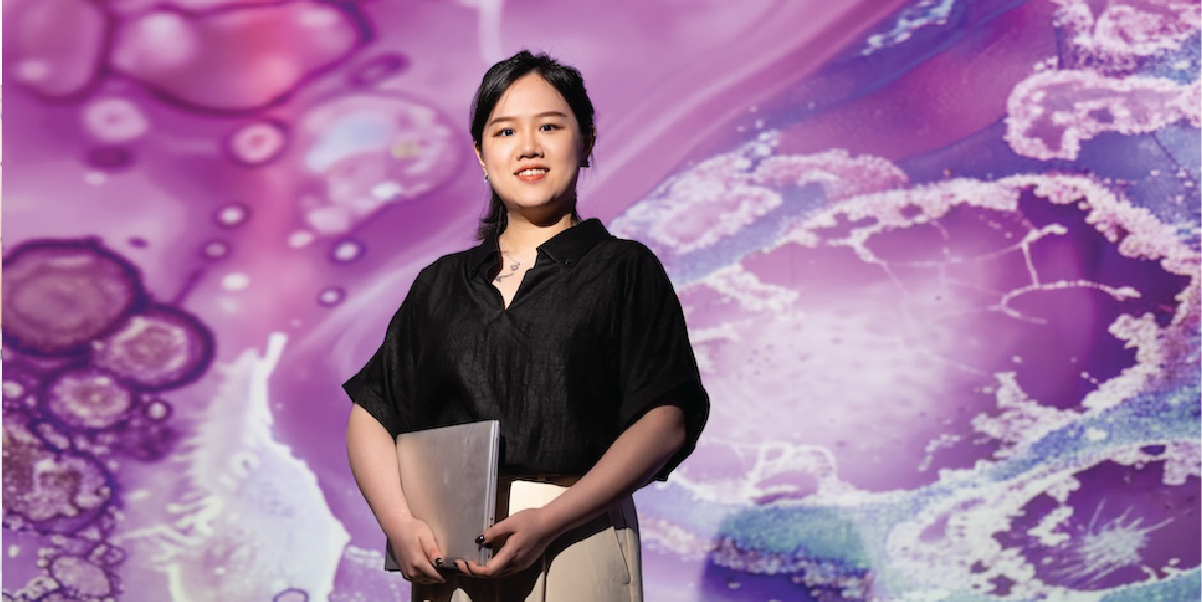Every year, breast cancer claims the lives of thousands of women in the U.S., but researcher Linglin Zhang is on a mission to change that narrative. With her Ph.D. in Data Science & Analytics from Kennesaw State University (KSU), she is applying artificial intelligence (AI) technology to enhance the early detection of breast cancer and develop more effective treatments.
“Imagine your body is a big city, and the cells are the people living in it,” Zhang said. “Sometimes, some people (cells) start acting strange and causing trouble, just like bad guys in the city. My job is to find out from the ‘forensic photography’ of where these bad guys are starting to cause trouble and figure out ways to prevent them so everyone can be happy and healthy again.”

Zhang, who defended her dissertation to earn a Ph.D. in Data Science and Analytics from KSU, analyzes mammogram images through the lens of data science to pinpoint abnormalities in screenings.
Her research, guided by KSU and Emory University faculties, involves using AI to classify images of breast cancer. Zhang utilizes a decade’s worth of material from Emory University to enhance her research and provide a comprehensive dataset for analyzing mammograms.
With its array of datasets in place, AI can then quickly detect patterns and abnormalities, enabling earlier detection and more personalized treatments.
“Artificial intelligence is like having a super-smart assistant who can help the radiologists to analyze a vast amount of data much faster and more accurately,” she noted.
Zhang’s research has already garnered attention, making waves at the Society for Imaging Informatics in Medicine’s annual meeting. However, her findings reveal that the AI model doesn’t perform uniformly for all patients. The model’s predictions vary depending on the patient’s background, health conditions, and the details in the images.
With breast cancer being the most common cancer among women and responsible for approximately 42,000 deaths annually in the U.S., the stakes are incredibly high. Regular mammograms can significantly reduce the risk of dying from this disease by catching it early. Yet, Zhang’s recent study uncovered a concerning truth: when mammograms reveal specific changes, like architectural distortion, the chances of missing a cancer diagnosis increase. This means the screening might overlook cancer cases when these changes are present, which could delay early detection and treatment.
“Science is a journey of discovery,” she remarked. “Each step we take brings us closer to understanding this complex disease and finding new ways to combat it.”
Zhang’s academic journey began in China, where she earned a bachelor’s degree in biological sciences from Hubei University. She went on to earn two master’s degrees in chemical biology and bioinformatics at the University of Michigan and the Georgia Institute of Technology. Eventually, all paths led to KSU where she discovered her passion for data science.
“I decided to switch to data science because I wanted to use the most efficient tools to do research in healthcare,” Zhang said. “I’m really interested in using data science and machine learning to build better tools that could improve people’s lives.”
In addition to her research, Zhang mentors undergraduate students and participates in outreach programs, emphasizing the importance of diversity in science.
“I’m a researcher, but more to that I’m a people person; I cherish people and appreciate their support. It’s the strong motivation of improving people’s living that drove my passion for research, and all the support I got from people at KSU continuously fuels that enthusiasm,” she exclaimed.
Zhang’s dedication extends to fairness and accuracy in her AI models, another testament to her thoroughness.
“We’re training the computer to be intelligent and accurate enough to help detect abnormalities in mammograms and assess the risk of breast cancer through them,” she said. “AI can be a strong helper to the medical professionals if being used appropriately, and to ensure the ethics of AI tools in completing the tasks, our goal is to ensure the model is fair and unbiased across all demographic groups.”
By analyzing where her AI model faltered, Zhang discovered that it was less accurate with dense tissue and images that showed structural changes. Using these insights, she is now developing a model that performs equitably in all patient subgroups for breast cancer detection, hoping her findings will support fellow researchers in the field.
“Everyone here is so friendly and supportive,” Zhang said. “From the Ph.D. program department to the School of Data Science and Analytics, the College of Computing and Software Engineering, and the Graduate College, everyone has been incredibly helpful.”
Collaboration with industry partners like Equifax has also enriched her experience, allowing her to apply her academic knowledge in real-world settings.
MinJae Woo, Zhang’s former advisor at KSU, recognized the challenges that come with medical research and praised her resilience.
“Working on medical research is often more challenging than it seems. We frequently ditch projects after putting in months of effort if they end up showing no potential benefit for patients. Zhang did not give up despite these challenges and discouragement. Her perseverance was undoubtedly the key to her success as a researcher.”
Looking to the future, Zhang plans to continue her research and apply innovative ideas to breast cancer research. With every step, she’s committed to using AI and data science to make sure that each patient’s story has a better chance of a happy ending. And, as she continues her journey, Zhang knows that the work she’s doing today will shape the future of healthcare for generations to come.
Like Zhang, many KSU researchers are redefining the future of healthcare.